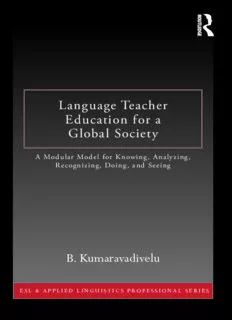Table Of ContentLanguage Teacher
Education for a
Global Society
A Modular Model for Knowing, Analyzing,
Recognizing, Doing, and Seeing
B. Kumaravadivelu
ESL & APPLIED LINGUISTICS PROFESSIONAL SERIES
Language Teacher Education for a
Global Society
“There is no other book like this for preparing more effective L2 teachers. All classroom
teachers will benefit from reading it and giving careful consideration as to how their own
practiceintheclassroomcanbeimproved.”
NeilAnderson,BrighamYoungUniversity,USA
“Offering a wide-ranging and high quality conceptualization, the coverage is masterly,
employing the profound reach of scholarship that the author has demonstrated in previous
publications. This book could be a core reference in the field for years to come, one to
which other attempts would be compared, and one on which other writers with more
specificinterestswoulddraw.”
JulianEdge,UniversityofManchester,UK
The field of second/foreign language teacher education is calling out for a coherent and
comprehensive framework for teacher preparation in these times of accelerating economic,
cultural, and educational globalization. Responding to this call, this book introduces a state-
of-the-art model for developing prospective and practicing teachers into strategic thinkers,
exploratory researchers, and transformative teachers. The model includes five modules:
Knowing,Analyzing,Recognizing,Doing,andSeeing(KARDS).Itsgoalistohelpteachers
understand
(cid:1) Howtobuildaviableprofessional,personalandproceduralknowledge-base;
(cid:1) Howtoanalyzelearnerneeds,motivationandautonomy;
(cid:1) Howtorecognizetheirownidentities,beliefsandvalues;
(cid:1) Howtodoteaching,theorizinganddialogizing;and
(cid:1) Howtoseetheirownteachingactsfromlearner,teacher,andobserverperspectives.
Providing a scaffold for teachers to build a holistic understanding of what happens in the
language classroom, this model eventually enables them to theorize what they practice and
practicewhattheytheorize.Withitsstrongscholarlyfoundationanditssupportingreflective
tasksandexploratoryprojects,thisbookisimmenselyusefulforstudents,practicingteachers,
teachereducators,andeducationalresearcherswhoareinterestedinexploringthecomplexity
oflanguageteachereducation.
B. Kumaravadivelu is Professor, Department of Linguistics and Language Development,
SanJoseStateUniversity.
ESL & Applied Linguistics Professional Series
Eli Hinkel, Series Editor
Kumaravadivelu(cid:1)LanguageTeacherEducationforaGlobalSociety:AModularModelforKnowing,
Analyzing,Recognizing,Doing,andSeeing
Vandergrift/Goh(cid:1)TeachingandLearningSecondLanguageListening: MetacognitioninAction
LoCastro(cid:1)PragmaticsforLanguageEducators:ASociolinguisticsPerspective
Nelson(cid:1)IntelligibilityinWorldEnglishes:TheoryandPractice
Nation/Macalister,Eds.(cid:1)CaseStudiesinLanguageCurriculumDesign
Johnson/Golumbek,Eds.(cid:1)ResearchonSecondLanguageTeacherEducation:ASocioculturalPerspectiveon
ProfessionalDevelopment
Hinkel,Ed.(cid:1)HandbookofResearchinSecondLanguageTeachingandLearningVolumeII
Nassaji/Fotos(cid:1)TeachingGrammarinSecondLanguageClassrooms:IntegratingForm-FocusedInstructionin
CommunicativeContext
Murray/Christison(cid:1)WhatEnglishLanguageTeachersNeedtoKnowVolumeI:UnderstandingLearning
Murray/Christison(cid:1)WhatEnglishLanguageTeachersNeedtoKnowVolumeII:FacilitatingLearning
Wong/Waring(cid:1)ConversationAnalysisandSecondLanguagePedagogy:AGuideforESL/EFLTeachers
Nunan/Choi,Eds.(cid:1)LanguageandCulture:ReflectiveNarrativesandtheEmergenceofIdentity
Braine(cid:1)NonnativeSpeakerEnglishTeachers:Research,Pedagogy,andProfessional Growth
Burns(cid:1)DoingActionResearchinEnglishLanguageTeaching:AGuideforPractitioners
Nation/Macalister(cid:1)LanguageCurriculumDesign
Birch(cid:1)TheEnglishLanguageTeacherandGlobalCivilSociety
Johnson(cid:1)SecondLanguageTeacherEducation:ASocioculturalPerspective
Nation(cid:1)TeachingESL/EFLReadingandWriting
Nation/Newton(cid:1)TeachingESL/EFLListeningandSpeaking
Kachru/Smith(cid:1)Cultures,Contexts,andWorldEnglishes
McKay/Bokhosrt-Heng(cid:1)InternationalEnglishinitsSociolinguisticContexts:TowardsaSociallySensitiveEIL
Pedagogy
Christison/Murray,Eds.(cid:1)LeadershipinEnglishLanguageEducation:TheoreticalFoundationsandPractical
SkillsforChangingTimes
McCafferty/Stam,Eds.(cid:1)Gesture:SecondLanguageAcquisitionandClassroomResearch
Liu(cid:1)Idioms:Description,Comprehension,Acquisition,andPedagogy
Chapelle/Enright/Jamison,Eds.(cid:1)BuildingaValidityArgumentfortheTestofEnglishasaForeign
LanguageTM
Kondo-Brown/Brown,Eds.(cid:1)TeachingChinese,Japanese,andKoreanHeritageStudents:Curriculum
Needs,Materials,andAssessments
Youmans(cid:1)Chicano-AngloConversations:Truth,Honesty,andPoliteness
Birch(cid:1)EnglishL2Reading:G ettingtotheBottom,SecondEdition
Luk/Lin(cid:1)ClassroomInteractionsasCross-culturalEncounters:NativeSpeakersinEFLLessons
Levy/Stockwell(cid:1)CALLDimensions:IssuesandOptionsinComputerAssistedLanguageLearning
Nero,Ed.(cid:1)Dialects,Englishes,Creoles,andEducation
Basturkmen(cid:1)IdeasandOptionsinEnglishforSpecificPurposes
Kumaravadivelu(cid:1)UnderstandingLanguageTeaching:FromMethodtoPostmethod
McKay(cid:1)ResearchingSecondLanguageClassrooms
Egbert/Petrie,Eds.(cid:1)CALLResearchPerspectives
Canagarajah,Ed.(cid:1)ReclaimingtheLocalinLanguagePolicyandPractice
Adamson(cid:1)LanguageMinorityStudentsinAmericanSchools:AnEducationinEnglish
Fotos/Browne,Eds.(cid:1)NewPerspectivesonCALLforSecondLanguageClassrooms
Hinkel(cid:1)TeachingAcademicESLWriting:PracticalTechniquesinVocabularyandGrammar
Hinkel/Fotos,Eds.(cid:1)NewPerspectivesonGrammarTeachinginSecondLanguageClassrooms
Hinkel(cid:1)SecondLanguageWriters’Text:LinguisticandRhetoricalFeatures
Visit www.routledge.com/education for additional information on titles in the ESL & Applied
LinguisticsProfessionalSeries
Language Teacher
Education For A Global
Society
A Modular Model for Knowing,
Analyzing, Recognizing, Doing,
and Seeing
B. Kumaravadivelu
Firstpublished2012
byRoutledge
711ThirdAvenue,NewYork,NY10017
SimultaneouslypublishedintheUK
byRoutledge
2ParkSquare,MiltonPark,Abingdon,OxonOX144RN
RoutledgeisanimprintoftheTaylor&FrancisGroup,aninformabusiness
©2012Taylor&Francis
TherightofB.Kumaravadivelutobeidentifiedasauthorofthisworkhas
beenassertedbyhiminaccordancewithsections77and78oftheCopyright,
DesignsandPatentsAct1988.
Allrightsreserved.Nopartofthisbookmaybereprintedorreproducedor
utilisedinanyformorbyanyelectronic,mechanical,orothermeans,now
knownorhereafterinvented,includingphotocopyingandrecording,orinany
informationstorageorretrievalsystem,withoutpermissioninwritingfromthe
publishers.
Trademarknotice:Productorcorporatenamesmaybetrademarksorregistered
trademarks,andareusedonlyforidentificationandexplanationwithoutintent
toinfringe.
LibraryofCongressCataloginginPublicationData
Kumaravadivelu,B.,1948-
Languageteachereducationforaglobalsociety:amodularmodelforknowing,
analyzing,recognizing,doing,andseeing/B.Kumaravadivelu.--1sted.
p.cm.--(ESL&appliedlinguisticsprofessionalseries)
Includesbibliographicalreferencesandindex.
1.Languageteachers--Trainingof.I.Title.
P53.85.K862011
418.0071--dc23
2011029808
ISBN13:978-0-415-87737-4(hbk)
ISBN13:978-0-415-87738-1(pbk)
ISBN13:978-0-203-83253-0(ebk)
TypesetinBembo
byTaylor&FrancisBooks
PrintedandboundintheU nitedStatesofAmericaonacid-freepaperby
WalsworthPublishingCompany,Marceline,MO
Dedicated to
those who teach and delight
The learned long for more learning not only because it
delights them but also because they can delight the world
with their learning.
(Thirukural, verse 399, circa 100 A.D.)
CONTENTS
Preface ix
Acknowledgments xiv
1 (Re)visioning Language Teacher Education 1
1.0 Introduction 1
1.1 Globalizing Perspectives 2
1.2 Operating Principles 11
1.3 Challenging Priorities 16
1.4 Designing KARDS 16
1.5 In Closing 17
2 Knowing 20
2.0 Introduction 20
2.1 Professional Knowledge 24
2.2 Procedural Knowledge 29
2.3 Personal Knowledge 32
2.4 In Closing 34
3 Analyzing 37
3.0 Introduction 37
3.1 Learner Needs 38
3.2 Learner Motivation 41
3.3 Learner Autonomy 45
viii Contents
3.4 Classroom Implications 48
3.5 In Closing 51
4 Recognizing 55
4.0 Introduction 55
4.1 Teacher Identities 56
4.2 Teacher Beliefs 59
4.3 Teacher Values 64
4.4 Interrogating the Teaching Self 68
4.5 In Closing 72
5 Doing 78
5.0 Introduction 78
5.1 Teaching 78
5.2 Theorizing 84
5.3 Dialogizing 90
5.4 In Closing 95
6 Seeing 99
6.0 Introduction 99
6.1 Learner Perspective 102
6.2 Teacher Perspective 105
6.3 Observer Perspective 107
6.4 A Case of and for Seeing-that 110
6.5 In Closing 118
7 (Re)making a Modular Model 122
7.0 Introduction 122
7.1 Models and Modules 123
7.2 Design and Delivery 125
7.3 Challenge and Change 129
7.4 Closings and Openings 130
References 133
Index 143
PREFACE
This book has been a long time coming. Eleven years, to be exact. I made the first
formalpresentation ontheproposedmodularmodelforlanguageteachereducation
in March 2000, at the 34th Annual TESOL Convention held in Vancouver,
Canada. I am writing this Preface immediately after I returned from the University
of Aston, Birmingham, England where, in July 2011, I gave a plenary talk at the
7th BAAL (British Association for Applied Linguistics) Special Interest Group on
Language Learning and Teaching—my last presentation on the model before I
finally managed to place the manuscript in the hands of the publishers.
In between Vancouver and Birmingham, I have given plenary talks, keynote
addresses or guest lectures on the model at the 4th International Conference on
LanguageTeacherEducation,UniversityofMinnesota,USA(June,2005),atHong
Kong Baptist University, Hong Kong (April, 2008), at Hong Kong Institute of
Education, Hong Kong (May, 2008), at the ESEA Conference in Singapore
(December, 2008), at the 2nd biennial International Conference of the Australian
Council of TESOL Associations, Gold Coast, Australia (July, 2010), at the 3rd
InternationalSeminaronProfessionalDevelopmentinForeignLanguageEducation
in Medillin, Colombia (August, 2010), and at the Defense Language Institute,
Monterrey, California (February, 2011). This book is indeed the fruit of several
years of reflection, review, and renewal.
Whilemythoughtsonthemodelhaveevolvedconsiderablyovertheyears,what
has remained constant, as the title of my March 2000 TESOL presentation—
“KARDS for teacher education”—shows, is the acronym KARDS, standing for
Knowing, Analyzing, Recognizing, Doing, and Seeing. The choice of dynamic
verbs, rather than static nouns, to refer to the componential parts of the model is
deliberate. So is the choice of the modular makeup of the model. My intention has
alwaysbeentomoveawayfromtraditionalwaysofdesigninglinear,product-based,

